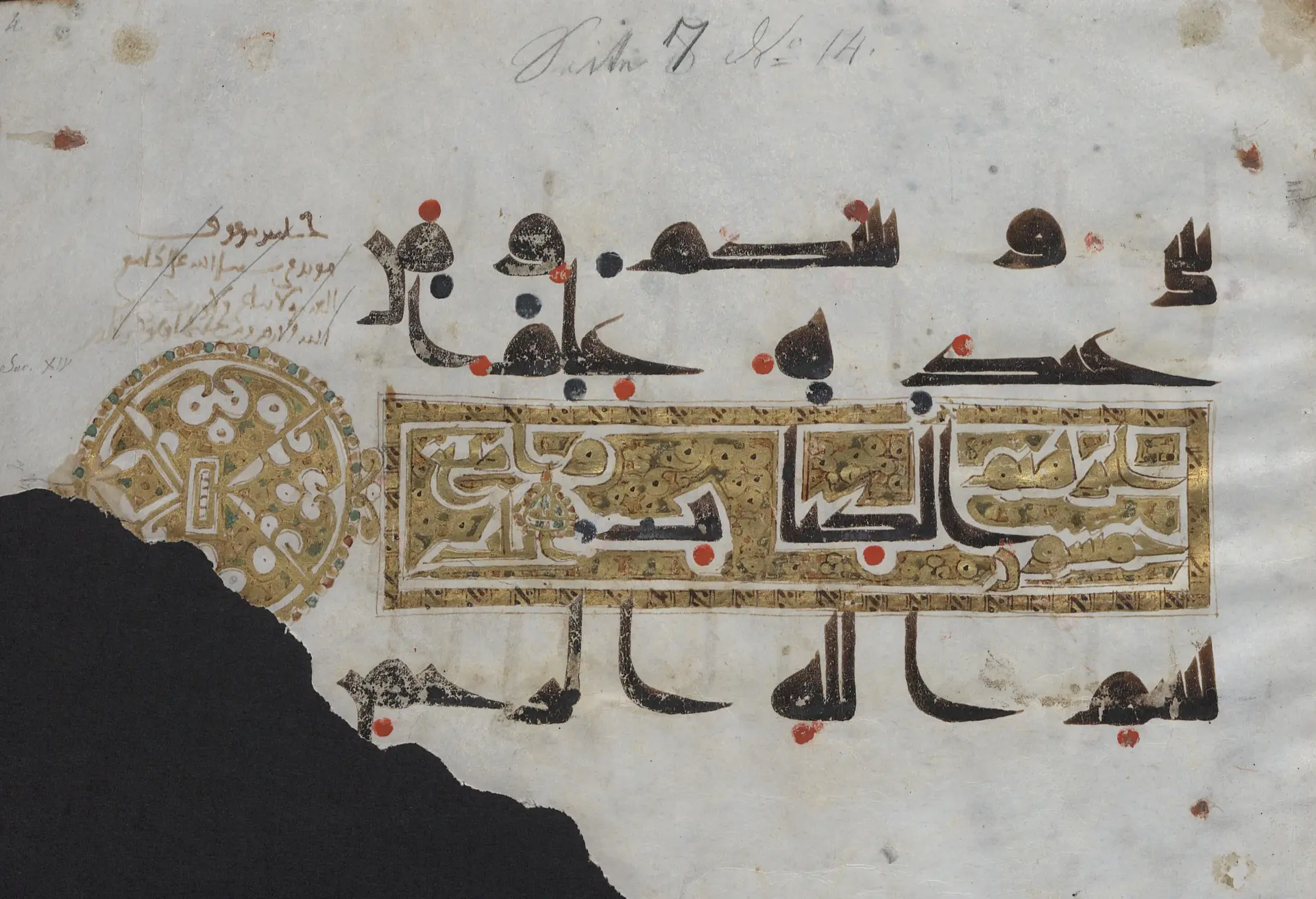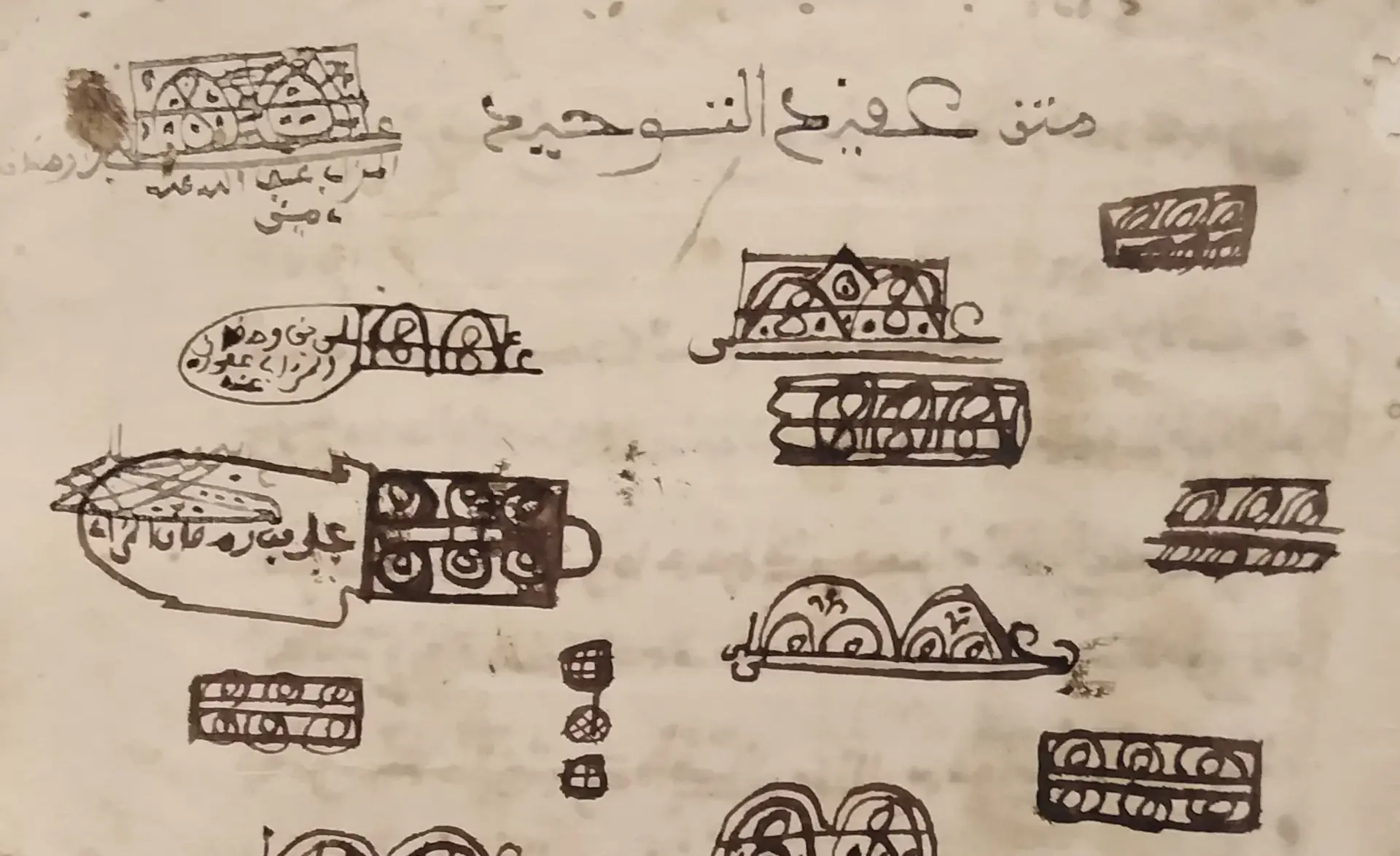Gotha Manuscript Talks, Spring 2025
The online series "Gotha Manuscript Talks" is organised by the Gotha Research Library in cooperation with Prof. Dr. Konrad Hirschler (Centre for the Study of Manuscript Cultures, University of Hamburg).
Chair: Dr Feras Krimsti (Gotha Research Library)
Wednesday, 19 March 2025, 6:15 CET
Dr. Alba Fedeli (Centre for the Study of Manuscript Cultures, University of Hamburg)
Seemingly Identical and Seemingly Different: Archaeometry and Philology in the Exploration of the Gotha Collection of Early Qur’an Manuscripts
The Gotha Research Library holds a valuable collection of fragments from early Qur’an manuscripts on parchment that were once preserved in the Mosque of ʿAmr b. al-ʿĀṣ (d. 664) in Fusṭāṭ, the ancient urban foundation located to the south of modern-day Cairo.
The provenance of the collection is well documented, but places and dates of manufacture are not given in the manuscripts. They instead exhibit a variety of elements added to the manuscripts over time, including updates to the writing systems, recitational signs, reading traditions, grammatical theories, corrections, and markers used to subdivide and navigate the text. The stratification of these changes and additions, however, are often imperceptible to the naked eye. What is seemingly identical may be the result of different agencies at different chronological stages in the life of the artefact. Conversely, what is seemingly different may in fact be the result of age and degradation.
How can codicologists and philologists approach the reading of manuscripts and their texts? Appearance must be filtered with the help of historical and philological knowledge to formulate hypotheses and address questions. In this paper, I show that non-destructive techniques for material analysis of pigments and inks can support or disprove hypotheses and solve uncertainties. They can contribute to the localisation and dating of manuscripts. In fact, establishing correlations between pigments or inks can provide a relative chronology and a clustering tool for manuscripts. If visual examination proves unsuitable to read these early Qur’anic manuscripts, the combination of historical, codicological, and philological interpretation with archaeometry offers an interdisciplinary methodology for manuscript studies and text analysis.
This talk presents ongoing research conducted in the framework of the project “What is in a scribe’s mind and inkwell” and shows some elements in the manuscripts that appear both seemingly identical and seemingly different that have been interpreted and solved by applying archaeometrical philology. The initial findings of this analysis, conducted in collaboration with the laboratory of CSMC Hamburg from the Cluster of Excellence “Understanding Written Artefacts” in February 2025, will be presented.
Alba Fedeli is a research associate at the Cluster of Excellence “Understanding Written Artefacts” (Universität Hamburg), as PI of the research project “What is in a scribe's mind and inkwell”. She studied in Italy with Sergio Noja and holds a Ph.D. from the University of Birmingham, UK, where she traced the history of the Qur’an manuscripts in the Mingana Collection. Her work includes the edition of the Mingana-Lewis Qur’an palimpsest. She has worked on several projects devoted to Qur’an manuscripts, including the digitisation of the Sanaa Palimpsest at Dar al-Makhtutat in 2007.
Wednesday, 2 April 2025, 6:15 CET
Prof. Nir Shafir (University of California, San Diego)
The Social Effects and Vanishing Traces of Pamphlets and Other Ephemeral Texts in the Early Modern Ottoman Empire
In the seventeenth century, Muslims in the Ottoman Empire became embroiled in a polarizing cultural war over the permissibility of everyday practices like worshipping at saints’ graves, smoking tobacco, and an odd medical procedure called “chickpea cauterization.” This talk traces this widespread religious and political polarization to the rise of a new “communication order,” focusing in particular on the advent of “pamphlets”: short, mobile, and polemical tracts, all copied by hand. The talk paints a new picture of the entire ecosystem of books in the manuscript culture of the early modern Ottoman Empire and focuses in particular on the possibility of tracing ephemeral works in the manuscript record.
Nir Shafir is an associate professor of history at UCSD whose work focuses on the Ottoman Empire/Middle East from 1200 to 1800. He is an occasional contributor and editorial board member of the Ottoman History Podcast and served as its editor in 2018. His first book is titled The Order and Disorder of Communication: Pamphlets and Polemics in the Seventeenth-Century Ottoman Empire and came out with Stanford University Press in October 2024.
Wednesday, 7 May 2025, 6:15 CET
Prof. Paul Love (Al Akhawayn University, Ifrane)
Ibadi Muslim Manuscript Cultures in the 19th-20th Century Maghrib
Ibadi Muslim communities in the Maghrib have a rich and long-standing manuscript culture that reflects the itinerant lives of the community’s scholars over the past millennium. Whether to seek knowledge, to carry out pilgrimage, or to do business, Ibadi scholars have been constantly on the move across northern Africa, the Mediterranean, western Asia, and the East African Coast. The manuscript libraries they have left behind tell these stories of migration and return. In this presentation, I share some features of the manuscript traditions of Ibadi communities in the Maghrib in its latter stages during the 19th and 20th centuries, highlighting the stories of individual scholars whose manuscripts allow us a glimpse into their lives as migrant students and scholars.
Paul Love is Associate Professor of History & Director of the Mohammed VI Library at Al Akhawayn University in Ifrane (AUI), located in the Middle Atlas Mountains of Morocco. His research focuses on the history of the Maghrib, with a special love for manuscripts, documents, libraries, and archives. He has authored two books, both published by Cambridge University Press: Ibadi Muslims of North Africa: Manuscripts, Mobilization, and the Making of a Written Tradition (2018) and The Ottoman Ibadis of Cairo: A History (2024). He has also contributed to several international manuscript documentation and digitization initiatives in the Maghrib, partnering with colleagues and friends in Algeria, Tunisia, Libya, and France to document and to preserve written material heritage in the region.




![[Translate to English:] Logo Universität Hamburg](/fileadmin/_processed_/6/3/csm_up-uhh-logo-u-2010-u-png_ff374285d0.webp)
![[Translate to English:] Logo CSMC](/fileadmin/_processed_/e/2/csm_CSMC-Logo-4c_neu_2020_verkleinert_d0081d0db0.webp)






![[Translate to English:] Logo Universität Hamburg](https://www.uni-erfurt.de/fileadmin/_processed_/6/3/csm_up-uhh-logo-u-2010-u-png_7dff6f3c5e.webp)
![[Translate to English:] Logo CSMC](https://www.uni-erfurt.de/fileadmin/_processed_/e/2/csm_CSMC-Logo-4c_neu_2020_verkleinert_ed4869aa06.webp)